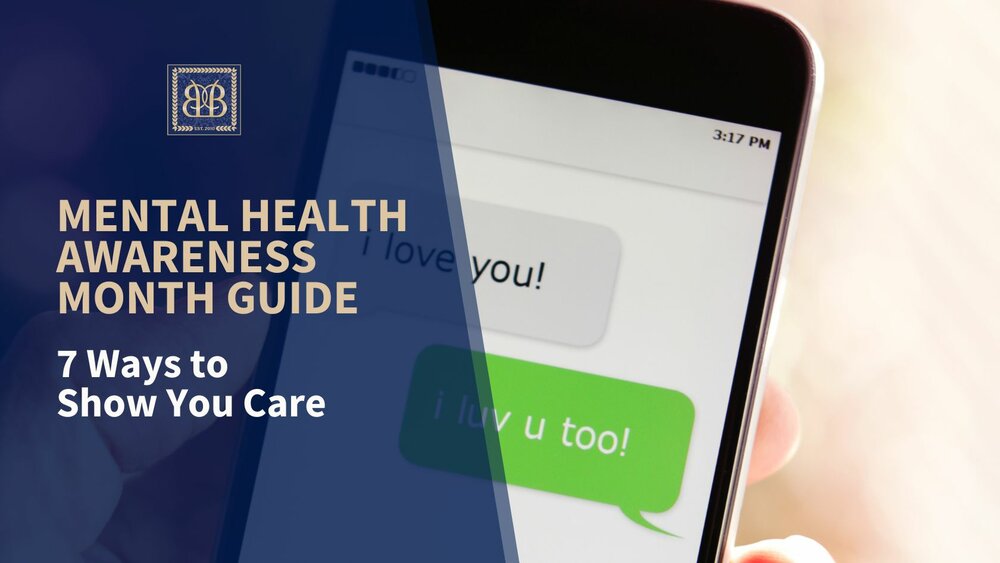Mental Health Awareness Month Guide: 7 Ways to Show You Care
Mental Health Awareness Month opens the door to compassion, connection, and conversations that make a difference.
We hear a lot about how to stay physically healthy—eat well, exercise, get enough sleep. But what about mental health? It’s just as important, yet it’s often overlooked. That’s why Mental Health Awareness Month, observed every May, is so meaningful. It reminds us that caring for our minds is as essential as caring for our bodies. In this article, we explore the origins of Mental Health Awareness Month, why it matters, and practical ways you can support mental wellness in your life and community.
How the Movement Took Shape
First recognized in 1949 by Mental Health America, the month-long observance was created to raise awareness, reduce stigma, and encourage open conversations about mental health. Over time, it has grown into a nationwide movement that highlights not only the challenges but also the hope and possibility of healing. Each year brings a new theme, and this year’s message, “Turn Awareness into Action”, challenges us to do more than just recognize the importance of mental wellness. It’s a call to take intentional steps that foster healing, resilience, and understanding.
Why Mental Health Awareness Matters
Even though mental health is a key part of overall well-being, it’s still often misunderstood or pushed aside. The numbers tell us just how urgent this issue really is:
· 1 in 5 U.S. adults experience a mental illness each year
· 1 in 20 adults live with a serious mental health condition
· 1 in 6 teens are affected by mental health issues but only about half receive treatment
· In 2023, 1 in 5 high school students seriously considered suicide
These are not just statistics. They represent real people—family members, friends, coworkers, and neighbors. Mental Health Awareness Month presents an opportunity to acknowledge their experiences, offer support, and encourage access to resources.
7 Simple Ways to Show You Care
You don’t have to be a mental health professional to make a difference. Everyday actions can help create a culture of openness, empathy, and support. Here are seven meaningful ways to get involved this May:
1. Start the conversation.
Talking openly about mental health helps reduce stigma and reminds others they’re not alone. Whether it’s a casual chat with a friend or sharing your experience in a group setting, your voice can be a source of connection and hope.
2. Check in on loved ones.
Sometimes the simplest gestures mean the most. A quick call, a thoughtful text, or an invitation to talk can let someone know they matter. Ask how they’re doing and then listen attentively without judgment or interruption.
3. Take care of your own mental health.
Self-care is more than a buzzword—it’s a necessity. Prioritizing your mental wellness through rest, healthy habits, or talking with a counselor can help you feel better while setting an example for others to do the same.
4. Educate yourself.
Learning more about mental health helps break down myths and replaces them with understanding. Visit trusted resources like Mental Health America, NAMI, or the National Institute of Mental Health to better understand various conditions, warning signs, and how to help.
5. Share helpful resources.
Not everyone knows where to turn for help. If someone you know is struggling, guide them to support networks, therapy options, or online tools like those listed above. If someone is in immediate crisis, you can call or text 988 to reach the National Suicide & Crisis Lifeline. This confidential service is available 24 hours a day, seven days a week, and can be a lifesaving step.
6. Support mental health organizations.
Organizations like NAMI and Mental Health America offer free programs, community outreach, and critical support to individuals and families. Consider joining a local event, volunteering, or making a donation to help these important efforts continue.
7. Be a safe space.
Let people know they can come to you without fear of being judged. A calm, caring presence can go a long way, especially for someone who feels alone. You don’t have to have all the answers. Sometimes, just being there is enough.
Mental health challenges often go unseen, but their effects are very real. Mental Health Awareness Month is a chance to care for one another in deeper, more intentional ways. Let’s keep the conversation going and continue turning awareness into action.
At Batchelor Brothers Funeral Services, we understand that grief and loss can deeply impact emotional and mental well-being. If you're mourning a loved one or supporting someone who is, please know you're not alone. We are here for you. Please reach out anytime.
About Batchelor Brothers Funeral Services: As a leading African American-owned and operated funeral and cremation organization, Batchelor Brothers Funeral Services has provided a ministry of care to thousands of grieving families. We promise to provide our highest level of distinguished service and respect to families who entrust us to honor their loved ones. With two convenient locations serving North and West Philadelphia, it is always our pleasure to be of service. For more information about our funeral, cremation, memorial, repast, and grief counseling services, please visit batchelorbrothers.com.







Comments